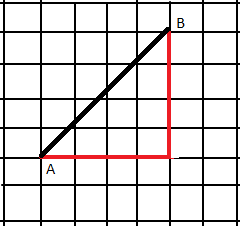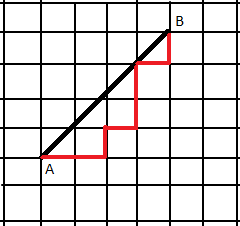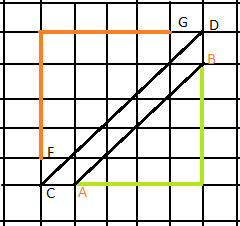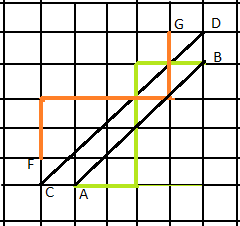给定一个整数n ,任务是计算可能长度为n的戴克词。 DYCK单词是仅包含字符‘X’和‘Y’的单词,因此在单词的每个前缀中frequency(’X’)≥frequency(’Y’)
例子:
Input: n = 2
Output: 2
“XY” and “XX” are the only possible DYCK words of length 2.
Input: n = 5
Output: 42
方法:
Geometrical Interpretation: Its based upon the idea of DYCK PATH.

The above diagrams represent DYCK PATHS from (0, 0) to (n, n).
DYCK PATH包含不与AB线段交叉的n条水平线段和n条垂直线段。
该问题背后的主要思想是找到从(0,0)到(n,n)的DYCK路径总数。
为了解决这个问题,主要思想是找到(0,0)到(n,n)之间的曼哈顿距离的路径总数,并排除所有穿过线段AB的路径。
How to calculate the number of paths that cross segment AB?
Let us call all those paths that cross AB as ‘incorrect’. The ‘incorrect’ paths which crosses AB must pass through line CD.
- Take symmetry of point A across line A.
- Draw a symmetrical line of the incorrect line taking reference with CD.

CD上的对称线。

FG-不对称线的对称线。
All those lines that crosses AB their symmetrical line that starts at F finishes at G(n-1, n+1).
Hence the number of incorrect lines are :
2 * nCn – 1
Hence number of DYCK words with n ‘X’ and n ‘Y’ is:
2 * nCn – 2 * nCn – 1 = (2 * n)! / (n)! * (n + 1)!
下面是上述方法的实现:
C++
// C++ implementation of the approach
#include
using namespace std;
// Function to return the count of
// Dyck Words of length n possible
long long int count_Dyck_Words(unsigned int n)
{
// Calculate the value of 2nCn
long long int res = 1;
for (int i = 0; i < n; ++i) {
res *= (2 * n - i);
res /= (i + 1);
}
// Return 2nCn/(n+1)
return (res / (n + 1));
}
// Driver Code
int main()
{
int n = 5;
cout << count_Dyck_Words(n);
return 0;
} Java
// Java implementation of the approach
class GFG
{
// Function to return the count of
// Dyck Words of length n possible
static int count_Dyck_Words( int n)
{
// Calculate the value of 2nCn
int res = 1;
for (int i = 0; i < n; ++i)
{
res *= (2 * n - i);
res /= (i + 1);
}
// Return 2nCn/(n+1)
return (res / (n + 1));
}
// Driver Code
public static void main(String[] args)
{
int n = 5;
System.out.println(count_Dyck_Words(n));
}
}
// This code is Contributed by Code_Mech.Python3
# Python3 implementation of the approach
# Function to return the count of
# Dyck Words of length n possible
def count_Dyck_Words(n) :
# Calculate the value of 2nCn
res = 1;
for i in range(n) :
res *= (2 * n - i);
res //= (i + 1);
# Return 2nCn/(n+1)
return (res / (n + 1));
# Driver Code
if __name__ == "__main__" :
n = 5;
print(count_Dyck_Words(n));
# This code is contributed by RyugaC#
// C# implementation of the approach
using System;
class GFG
{
// Function to return the count of
// Dyck Words of length n possible
static int count_Dyck_Words( int n)
{
// Calculate the value of 2nCn
int res = 1;
for (int i = 0; i < n; ++i)
{
res *= (2 * n - i);
res /= (i + 1);
}
// Return 2nCn/(n+1)
return (res / (n + 1));
}
// Driver Code
public static void Main()
{
int n = 5;
Console.WriteLine(count_Dyck_Words(n));
}
}
// This code is Contributed by Code_Mech.PHP
42